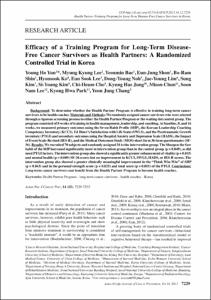KUMEL Repository
1. Journal Papers (연구논문)
1. School of Medicine (의과대학)
Dept. of Obstetrics & Gynecology (산부인과학)
Efficacy of a Training Program for Long-Term Disease-Free Cancer Survivors as Health Partners: A Randomized Controlled Trial in Korea
- Keimyung Author(s)
- Cho, Chi Heum
- Department
- Dept. of Obstetrics & Gynecology (산부인과학)
- Journal Title
- Asian Pacific Journal of Cancer Prevention
- Issued Date
- 2013
- Volume
- 14
- Issue
- 12
- Abstract
- Background: To determine whether the Health Partner Program is effective in training long-term cancer
survivors to be health coaches. Materials and Methods: We randomly assigned cancer survivors who were selected
through a rigorous screening process to either the Health Partner Program or the waiting-list control group. The
program consisted of 8 weeks of training in health management, leadership, and coaching. At baseline, 8, and 16
weeks, we measured primary outcomes using the Seven Habit Profile (SHP), the Korean Leadership Coaching
Competency Inventory (KCCI), Ed Diner’s Satisfaction with Life Scale (SWLS), and the Posttraumatic Growth
inventory (PTGI) and secondary outcomes using the Hospital Anxiety and Depression Scale (HADS), the Impact
of Event Scale-Revised (IES-R), and the Medical Outcomes Study (MOS) short form 36-item questionnaire (SF-
36). Results: We recruited 70 subjects and randomly assigned 34 to the intervention group. The Sharpen the Saw
habit of the SHP increased significantly more in intervention group than in the control group (p = 0.049), as did
most PTGI factors. The intervention group also showed a significantly greater enhancement of vitality (p = 0.015)
and mental health (p = 0.049) SF-36 scores but no improvement in KCCI, SWLS, HADS, or IES-R scores. The
intervention group also showed a greater clinically meaningful improvement in the “Think Win-Win” of SHP
(p = 0.043) and in the personal strength score (p = 0.025) and total score (p = 0.015) of the PTGI. Conclusions:
Long-term cancer survivors can benefit from the Health Partner Program to become health coaches.
Keywords: Health Partner Program - long-term cancer survivors - health coaches - Korea
- Keimyung Author(s)(Kor)
- 조치흠
- Publisher
- School of Medicine
- Citation
- Young Ho Yun et al. (2013). Efficacy of a Training Program for Long-Term Disease-Free Cancer Survivors as Health Partners: A Randomized Controlled Trial in Korea. Asian Pacific Journal of Cancer Prevention, 14(12), 7229–7235. doi: 10.7314/APJCP.2013.14.12.7229
- Type
- Article
- ISSN
- 1513-7368
- Appears in Collections:
- 1. School of Medicine (의과대학) > Dept. of Obstetrics & Gynecology (산부인과학)
- 파일 목록
-
-
Download
 oak-aaa-00447.pdf
기타 데이터 / 654.68 kB / Adobe PDF
oak-aaa-00447.pdf
기타 데이터 / 654.68 kB / Adobe PDF
-
Items in Repository are protected by copyright, with all rights reserved, unless otherwise indicated.